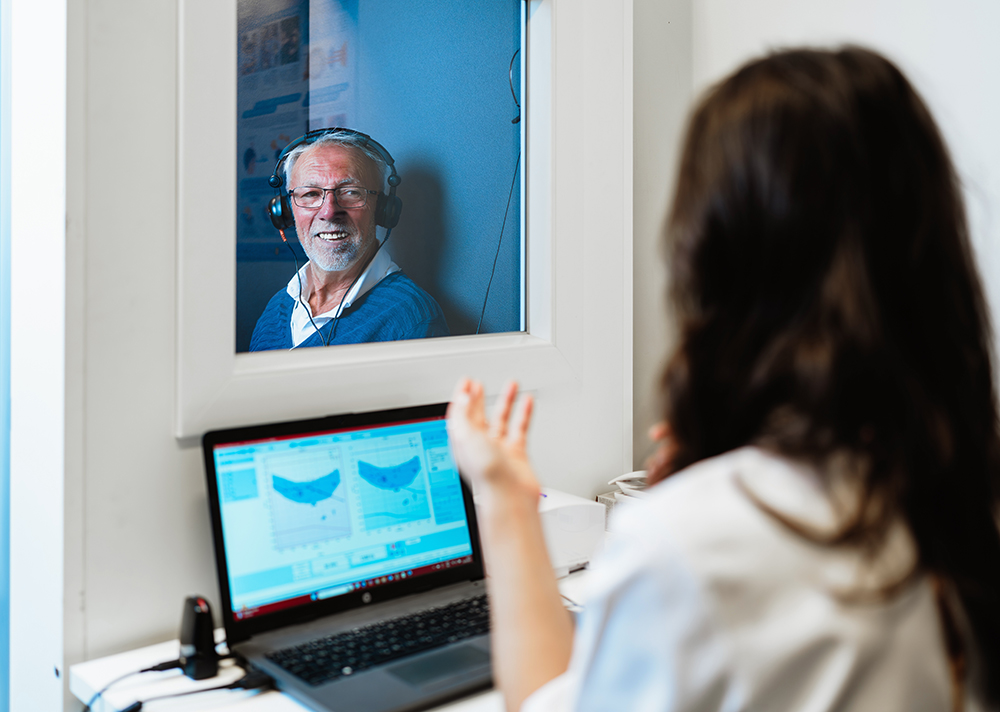The Role of Hearing Tests in Preventative Health Care
Hearing tests are an important part of preventative health care, yet many
New Location Now Open in Fort Mitchell! LEARN MORE →

By: Vanessa Ewert, Au.D, LIC.-A | May 23, 2025
The field of audiology is changing rapidly as new technologies reshape how we address hearing health. For audiologists, keeping up with these advances isn’t just about professional development – it’s about ensuring patients receive the best possible care. When you visit an audiologist, you expect them to know about the latest hearing aids, diagnostic tools and treatment approaches that could help you hear better. This knowledge doesn’t happen by accident; it requires audiologists to consistently update their skills and understanding through various professional development activities.
Staying current in audiology means balancing clinical expertise with technological literacy. As hearing devices become more sophisticated – with features like smartphone connectivity, artificial intelligence and rechargeable batteries – audiologists must understand not just how these devices work, but how to match them to each patient’s specific needs. This ongoing learning process helps ensure that when you seek help for hearing concerns, your audiologist can offer solutions that fit your lifestyle, hearing needs and personal preferences. The difference, between an audiologist who stays current and one who doesn’t, can significantly impact your hearing health outcomes and quality of life.
An audiologist is a licensed healthcare professional who specializes in identifying, diagnosing and managing hearing and balance disorders. To be qualified for this role, audiologists must complete a rigorous academic path, beginning with a bachelor’s degree – usually in communication sciences and disorders, biology, psychology or a related field. This undergraduate education builds a strong foundation in human anatomy, physiology and basic audiological principles, preparing students for the highly specialized training that comes next.
After earning a bachelor’s degree, aspiring audiologists must complete a Doctor of Audiology (Au.D.) program, which typically takes four years. This program includes a combination of classroom instruction, laboratory work and extensive clinical training. Coursework covers a wide range of topics, including auditory system anatomy, diagnostic testing, amplification technologies, auditory rehabilitation, balance disorders and counseling techniques. The final year of the program is often a full-time clinical externship, giving students hands-on experience working with patients under the supervision of licensed professionals.
Upon completing the Au.D., graduates must pass a national exam and meet any additional state-specific licensing requirements to practice. Many audiologists also choose to pursue certification through professional organizations like the American Speech-Language-Hearing Association (ASHA) or the American Board of Audiology (ABA), which signals a commitment to maintaining high standards of care and continuing education. This extensive academic and clinical preparation ensures that audiologists are not only experts in hearing and balance disorders but also capable of providing compassionate, individualized care to people of all ages.
Continued learning is an essential part of an audiologist’s professional life. Even after completing a doctoral program and earning a license, the field of audiology continues to evolve through new research, changing technologies and updated clinical guidelines. To stay current, audiologists participate in ongoing education that helps them maintain their licenses, meet certification standards and most importantly, provide the best possible care for patients. This learning can take many forms – from formal coursework to hands-on workshops to attending national conferences where new tools and methods are introduced.
Much of this continuing education focuses on advancements in hearing aid technology, diagnostic procedures, auditory rehabilitation techniques and strategies for managing complex hearing or balance conditions. As hearing aids and assistive devices become more sophisticated, audiologists must stay informed on programming methods, connectivity features and real-world performance so they can effectively tailor devices to each patient’s unique hearing profile and lifestyle. Workshops and manufacturer trainings are especially valuable in this area, allowing audiologists to gain direct experience with evolving tools and software.
Continued learning also includes staying updated on regulations, ethical standards and patient care models. For audiologists who work with diverse populations – like children, older adults or people with additional medical conditions – this knowledge helps them adapt their care to match different needs. In many cases, audiologists go beyond the required minimum and actively pursue specializations or certifications in areas like tinnitus management or auditory processing disorders. This commitment to lifelong learning reflects the heart of the profession – a desire to remain effective, informed and responsive to the people they serve.
Conferences and seminars are a cornerstone of professional development for audiologists. These gatherings offer more than just lectures – they create immersive learning environments where participants can explore case studies, engage with emerging research and try out new diagnostic tools and hearing technologies in hands-on demonstrations. Whether it’s a regional event or a large national conference, the sessions often cover a wide range of topics, from updated clinical protocols to advancements in hearing aid design, pediatric care techniques or balance assessment strategies. Attending these events allows professionals to deepen their expertise and return to their clinics with practical skills that directly benefit their patients.
Beyond the educational sessions, these events play a critical role in shaping the future of hearing care through collaboration and networking. Audiologists, researchers, educators and industry partners come together to discuss pressing challenges – like improving access to hearing care in underserved communities, refining teleaudiology practices or supporting aging populations with complex needs. These conversations often lead to new partnerships, research initiatives or innovations that improve care standards across the profession.
Professional associations serve as a vital support system for audiologists, providing more than just access to current research. These organizations cultivate a shared professional identity and foster a sense of belonging within the field. Through curated newsletters, expert-led webinars, peer-reviewed journals and continuing education modules, members stay updated on clinical advancements, policy changes and real-world applications of new technologies. Whether it’s learning about the latest fitting algorithms or reviewing emerging data on hearing loss in younger populations, specialists benefit from a steady stream of trusted information tailored to their needs.
These associations also serve as advocates – both for practitioners and the individuals they serve. They often play a central role in legislative efforts to improve insurance coverage, expand access to hearing care and ensure that licensure standards are upheld across regions. In doing so, they help protect patients’ rights while supporting professional accountability. Membership in these organizations is more than a formality – it’s a statement of dedication to evidence-based practice, ethical standards and lifelong learning.
Keeping up with scientific research and publications is a critical part of an audiologist’s professional development. Through these sources, they learn about the latest findings in hearing health, which can then be applied to their practice. Regularly reading academic journals, attending webinars and reviewing other scholarly materials ensure these professionals are knowledgeable about the most recent advances in their field.
Scientific research often provides new insights into how to manage hearing loss more effectively. It may introduce innovative techniques or technologies that can improve patient outcomes. Similarly, publications often feature case studies or practical advice from seasoned professionals that can enhance the quality of care provided by an audiologist.
In the digital age, online courses and webinars have become a popular tool for audiologists to stay updated. These platforms offer a wealth of knowledge, allowing specialists to learn at their own pace and convenience.
From understanding new diagnostic tools to learning about the latest research in hearing loss management, these online resources provide comprehensive information. So, you can be sure that your audiologist is using these digital learning tools to ensure they are equipped with the most current knowledge in their field.
The world of diagnostic tools and techniques in hearing care can sometimes be a bit overwhelming. With constant advancements, it’s hard to keep track of what’s new and how it can benefit you.
The solution here lies in understanding these complex technologies and their implications for your hearing health. A good approach is to have open conversations with your audiologist. They can explain the latest diagnostic tools and techniques, breaking down technical jargon into understandable terms. This way, you’ll be better informed about your hearing health and the steps taken to improve it.
Technological advancements are revolutionizing the landscape of hearing care practice. These changes have far-reaching implications, affecting both the methods of treatment and the overall patient experience. Innovations in technology not only enhance diagnostic accuracy but also improve the effectiveness of hearing aids and other assistive devices. As a result, you can expect more personalized care tailored to your specific hearing needs.
In recent years, there has been a surge in technological advancements for hearing aids. These innovations have led to more sophisticated devices that offer better sound quality and improved functionality. For example, modern hearing aids can now connect directly to smartphones and televisions via Bluetooth, providing you with a seamless listening experience.
Many of today’s hearing aids come with features like noise reduction and directional microphones that help you focus on what you want to hear while minimizing background noise. These improvements not only enhance your ability to communicate but also make everyday tasks more enjoyable.
Continued education gives audiologists the tools they need to support you not just during the appointment, but as you adjust to the changes hearing loss can bring to daily life. As new research sheds light on the emotional and social effects of hearing loss, audiologists are learning better ways to guide you through those adjustments. This might include helping you understand how to communicate more confidently with family, how to manage frustration in group settings or how to adapt your environment to make listening easier.
When an audiologist keeps learning, they’re better prepared to recognize the personal side of hearing loss and provide more meaningful counseling. This includes knowing how to talk through concerns about stigma, help you set realistic expectations and offer encouragement when progress feels slow. Continued professional development ensures they’re equipped not just with technical skills, but with the communication techniques and psychological insights that help you feel supported as you adjust to change. The goal is always to help you feel more confident, more informed and better prepared for the hearing challenges you face.
Keeping up with evolving technology and treatment strategies is one way audiologists stay prepared to offer you more than just hearing tests – they’re able to provide real guidance in a world where hearing care is changing fast. When your audiologist invests in continued learning, they’re better able to explain new device features, help you feel confident using them and tailor those tools to your daily life. Whether it’s understanding sound environments more clearly or feeling less overwhelmed by communication challenges, you benefit directly from your audiologist’s commitment to learning and adapting.
If you’re ready to take the next step toward clearer hearing and more personalized care, you don’t have to look far. Contact Bluegrass Hearing Clinic at (859) 295-5729. With multiple locations throughout Kentucky – including Bardstown, Danville, Elizabethtown, Frankfort, Lexington, Mount Sterling, Nicholasville, Paris, Richmond and Somerset – we make it easier to connect with knowledgeable professionals who stay up to date, so you don’t have to figure it all out alone.
Tags: audiology services

Hearing tests are an important part of preventative health care, yet many
By: Vanessa Ewert, Au.D, LIC.-A | November 18, 2025

Living with tinnitus means dealing with sounds that only you can hear,
By: Vanessa Ewert, Au.D, LIC.-A | October 3, 2025

When you’re getting your hearing tested, you might be surprised by
By: Vanessa Ewert, Au.D, LIC.-A | September 24, 2025
